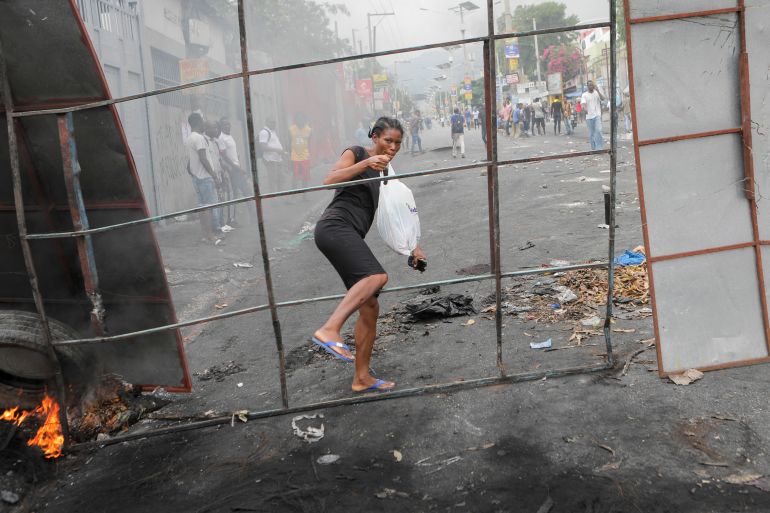Haiti sees more protests as fuel price hike worsens public anger
Haitian government’s decision to raise fuel costs adds to ongoing anger over gang violence, soaring inflation.

People have taken to the streets in several cities across Haiti after the government announced a substantial increase in the price of fuel that will further squeeze a population already struggling with soaring costs of living.
The Haitian authorities announced on Wednesday that the price of gas will more than double, with slightly smaller increases for diesel and kerosene.
Keep reading
list of 3 itemsHaitian journalists killed while reporting on violence in capital
UN decries rising death toll, rights violations in Haiti
The government, which controls the price of gas, did not say when the new prices would come into effect but tweeted that “prices in Haiti are significantly lower than those on the international market”.
The communications ministry also said on Twitter that the cost of importing petroleum products “amounts to 9 billion gourdes [$76.2m] per month, twice as much as the monthly state payroll”.
Protesters blocked roads throughout the capital Port-Au-Prince, closing off usually busy areas of the city to traffic. Schools and businesses closed as streets were blocked with rocks, vehicles, and burning tyres.
The demonstrations are the latest to rock the Caribbean nation, which has been grappling with rising inflation as well as an escalation in gang-related violence.
“It’s a very challenging time for Haiti right now,” Haitian journalist Harold Isaac told Al Jazeera around midday. Haitians also are grappling with soaring inflation, he said, while insecurity has worsened in the aftermath of President Jovenel Moise’s killing in July 2021.
“We’re facing a compounding set of crises, the latest one being the gas crisis that really has made life very difficult for everyday folks here,” said Isaac, adding that some Haitians have had to resort to smugglers to get fuel — often at inflated costs.
“It’s virtually impossible as it is right now to get gas from gas stations,” he said.
The government has justified the price increase by saying that it is no longer tenable to subsidise fuel as much as it used to.
Haiti had previously received its petroleum from Venezuela’s Petrocaribe programme, which shut down several years ago. Since then, it has helped subsidise local distributors who import fuel.
Some have raised concerns that the newly announced price hike, which will see the price of a gallon (3.8 litres) of gas go from about $2 to $4.78, will lead some Haitians to leave the country. Many people in Haiti depend on fuel not only for transportation, but also for electricity and cooking.
Marc Andre, a 28-year-old moto-taxi driver, told The Associated Press news agency that he was considering crossing the border into neighbouring Dominican Republic to seek out work as a construction worker.
“The price I’m going to charge, most people won’t be able to afford it,” he said. “It’s best for me to leave the country.”
Haiti has struggled to cope with an inflation rate of 30 percent, as well as escalating violence from armed gangs. Two Haitian journalists were murdered and their bodies burned as they were reporting on rising violence in a Port-Au-Prince neighbourhood over the weekend.
Prime Minister Ariel Henry had warned in a national address on Monday that fuel prices would rise and urged residents to have patience.
“The country has a lot of problems,” Henry said. “I am calling on everyone to stay calm. The government is working with what it has.”